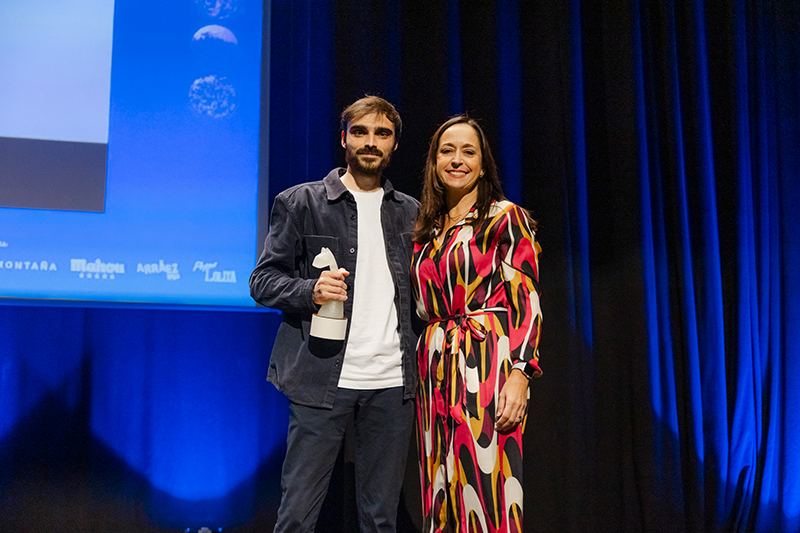
by S0p0rt3 | Feb 19, 2024 | Ribera |
- This week, the healthcare group has received such outstanding awards as a gold and a silver statuette, as well as the special jury prize at the most important creative festival in the Valencian Community for its Ritmos de Vida campaign, also awarded as best campaign by New Medical Economics.
- The president, Alberto de Rosa, and the councillor, Elisa Tarazona, also receive awards for their work on behalf of patients and families with rare diseases and for female leadership in healthcare management, and the Innovation Club recognises Ribera for the most innovative project, large company category.
In recent days, Ribera has received several awards for one of its star campaigns this year, Ritmos de Vida, focused on helping to prevent cardiovascular diseases with a creative concept that unites music and health, as well as for the health group’s management, represented in values such as humanisation and clinical leadership.
The first awards came last Friday at the Festival La Lluna, one of the most important creative competitions in Spain. The Ritmos de Vida campaign, designed by the Maart agency for the Ribera group, was awarded a Gold statuette, a Silver statuette and the jury’s special prize for the best campaign. The Advertising and Creative Communication Festival of the Valencian Community held its 12th edition on 24 November, with more than 300 entries from 28 agencies and more than 100 advertisers. The event, organised by the Association of Advertising Communication Companies, aims to highlight the value of Valencian creativity and increase the visibility of the agencies.
Just a few days later, on Tuesday 28th, the digital publication New Medical Economics recognised in its annual awards the female leadership of the CEO of the Ribera Group, Elisa Tarazona, as well as the awareness campaign for the prevention of cardiovascular diseases, Ritmos de Vida, which was awarded the prize for the Best social and health dissemination campaign.
The awards ceremony, which took place in Madrid, was attended by Ribera’s CEO, Elisa Tarazona, accompanied by the president of the health group, Alberto de Rosa, as well as Ribera’s Director of Communication, Marketing and CSR, Angélica Alarcón, who was in charge of collecting the award for the Ritmos de Vida campaign.
During her speech, Elisa Tarazona expressed her gratitude for the recognition and took the opportunity to highlight the role of women in management and middle management in any company, especially in healthcare companies. “In the Ribera Group, 70% of our professionals are women and, therefore, more than half of the middle managers are also women”, she assured.
Yesterday, the president of the Ribera healthcare group, Alberto de Rosa, received the award for healthcare company of the year from the National Institute for Rare Diseases INDEPF, which every year recognises, at a charity gala where it presents its “Rare” awards, the work and efforts of individuals, companies and institutions in favour of patients and families with rare diseases.
Yesterday, the Innovation Club also recognised Ribera in its awards for the good results of its Chronic Patient Management Programme, as the Most Innovative Project, large company category. Specifically, this programme includes innovative technology based on artificial intelligence, such as that provided by the virtual caregiver Lola, implemented by Tucuvi. The award was collected by the Innovation Director, Manuel Bosch, and by the group’s Digital Transformation Officer, Tania Menéndez.
About Rhythms of Life
Ritmos de Vida is the name given to the Ribera Group’s campaign that unites health and music to raise awareness of cardiovascular diseases and associated risk factors and which involved the construction of the first ever arrhythmic metronome, which has been the protagonist of a travelling exhibition in its hospitals and the focus of activities with patients, conferences and musical performances to link music and cardiovascular health. Today Ritmos de Vida brings together all the actions of the healthcare group related to music and health, from music therapy to prenatal music workshops, therapeutic use in units such as Intensive Care in some of its hospitals, day hospital and Mental Health, among others.
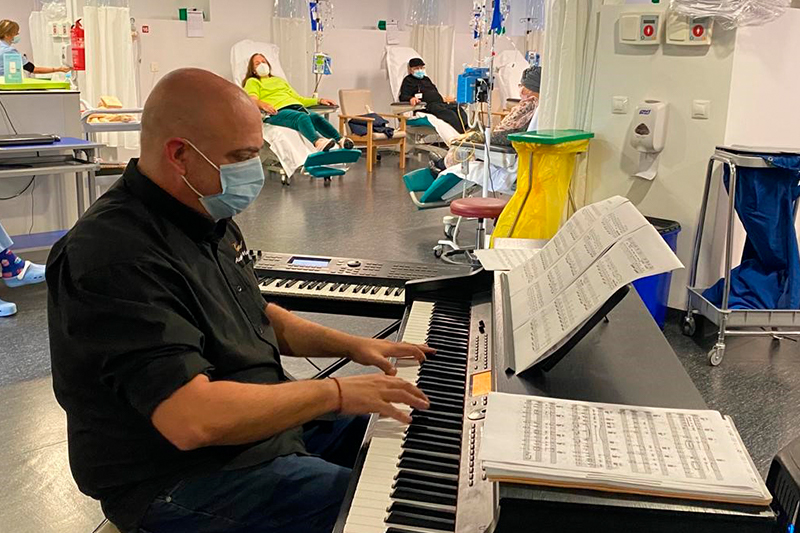
by S0p0rt3 | Feb 19, 2024 | Ribera |
- Music therapy, micro-concerts, prenatal singing, music libraries, collaborations with health musicians and a channel with song lists adapted to groups of patients are some of the actions promoted by the health group in its hospitals and which are included in the Rhythms of Life programme.
- Various specialists claim that music therapy can reduce blood pressure and heart rate and have a direct effect on stress and anxiety, as well as influencing cognitive and emotional levels.
- During 2023, the Rhythms of Life programme focused on outreach for the prevention of cardiovascular disease with the construction of the first ever arrhythmic metronome.
The Ribera healthcare group is giving new impetus to music therapy and the different actions that unite music and health in its hospitals, to improve the well-being of its patients and contribute positively to their recovery. Workshops, micro-concerts, prenatal singing, music games and a Spotify channel with different playlists are some of the activities that are now grouped together in the Ritmos de Vida group’s macro-programme.
Ritmos de Vida was born a year ago as a project to raise awareness of the importance of heart health by linking the tempo of music to the rhythm of heartbeats and building the first ever arrhythmic metronome. This campaign, carried out with the help of the creative agency Maart, has been displayed in the group’s main hospitals, which have also organised conferences and talks to help patients prevent cardiovascular risks, as well as music therapy workshops and live performances.
All the initiatives organised by Ribera that link music and health are now part of the Rhythms of Life macro-programme, and the group’s objective is to progressively incorporate all the new actions in this line. “More and more scientific studies are linking music to wellbeing and quality of life,” explains Ribera Polusa hospital psychologist Belén Vázquez, who assures us that “it is a good therapeutic tool, which is becoming increasingly important in clinical practice, affecting the physical, cognitive, emotional, social and behavioural components”.
Dr. Alex García, head of Neurology at Denia Hospital, assures that music therapy “has a controlled influence, among other things, on motor skills, memory, attention, creativity, verbalisation, strengthening of the senses, proprioception, reduction of stress and anxiety, brain stimulation, the immune system and biological rhythms”. Hence, as the Ribera Polusa psychologist recalls, it has very beneficial effects on sleep disorders, anxiety, depression, personality disorders or phobias of different types. Micro-concerts organised in areas such as dialysis, oncology day hospital or the ICU have been very well received by patients and their benefits have been demonstrated.
Christelle García, psychologist at the Vinalopó University Hospital, says that “some clinical studies show that music therapy can be used as an alternative therapy in the treatment of depression, autism, schizophrenia and dementia, as well as for problems of agitation and substance abuse, with benefits in the field of social isolation, cognitive sphere and psychotic symptoms”. He also explains that “in patients admitted to the ICU, music therapy can help them by reducing heart rate, respiratory rate and blood pressure, which facilitates a relaxation response”. In the ICU of the Hospital Universitario de Torrejón, music is “a non-pharmacological tool to improve the physical and emotional well-being of patients and their relatives”, as the supervisor of this unit, Conchi Faura, explains. “Music therapy has been shown to reduce stress and anxiety in patients, creating a positive atmosphere during their stay in a complicated space,” she adds.
In addition, music therapy and prenatal singing workshops have been introduced in the group’s hospitals to help pregnant women relax. With paediatric patients, music also has a “calming” effect. Hospitals such as the university hospitals of Vinalopó and Torrejón, Denia, Ribera Povisa, Ribera Polusa or Ribera Hospital de Molina have already demonstrated how well they are received by patients. A patient recently wrote about an experience with music therapy at Torrejón Hospital: “Both my father, who was admitted to the ICU, and we burst into tears when we heard you, and the emotion was at its peak when we saw my father moved, remembering childhood experiences thanks to your beautiful melodies and voices. Music therapy should be a compulsory treatment”.
In order to disseminate the benefits of music in the field of health to the general public, as well as to patients and professionals themselves, the Ribera Group has recently launched a Spotify channel with personalised music playlists for different groups of patients and professionals.

by S0p0rt3 | Oct 30, 2023 | Ribera |
- The directors of the Foundation and the Breast Area of the health group, Mercedes Gozalbo and Julia Camps, attend the meeting of the European project that develops a “swarm learning” to improve the accuracy of Artificial Intelligence.
- The meeting, held in Athens, allows progress to be made on a common tool that will help to anticipate the disease, improve individualised treatments and monitor its evolution more precisely, reducing uncertainty for patients.
Artificial Intelligence is not the future, it is the present. That is why the Ribera healthcare group has been part, for several months now, of the work team of the European ODELIA project, whose objective is to develop an advanced Artificial Intelligence model, including a secure exchange of data, in this case to create even more personalised predictive and follow-up models for breast cancer. This week, the project has taken a new step to advance a common tool, which will allow the exchange of valuable information without sharing patient data, with the working meeting attended by the directors of the Ribera Salud Foundation and the Breast Area, Mercedes Gozalbo and Julia Camps respectively. “The next step is for all members to start uploading images and data, to help the AI model learn,” explains the Foundation’s director.
The international prestige of the group’s Breast Area, led by Dr Camps, and the large number of patients treated in the breast units of Ribera hospitals, make Ribera a strategic partner of this European project. “ODELIA will help to improve the individualised treatment of patients and will also be a tool to help predict the disease. It will also reduce uncertainty about the evolution of breast cancer, thanks to the predictive model, as well as the response to drugs, which will allow patients’ treatment to be personalised earlier and with greater certainty,” explains Dr. Julia Camps.
The ODELIA project is a decentralised swarm machine learning solution that allows multiple collaborators to share information without sharing the patient data itself, protecting the privacy and security of the data, yet allowing all collaborators to benefit from the collective learning. Data governance and privacy are preserved.
“When organisations only have access to their own data, their AI models evolve based only on information about the people the organisation has worked with or works with, which creates a bias in the models. With swarm learning, an organisation can combine its data with learnings from other organisations, increasing accuracy and reducing bias,” explains the director of the Ribera Salud Foundation.
The next ODELIA project meeting will take place in spring.
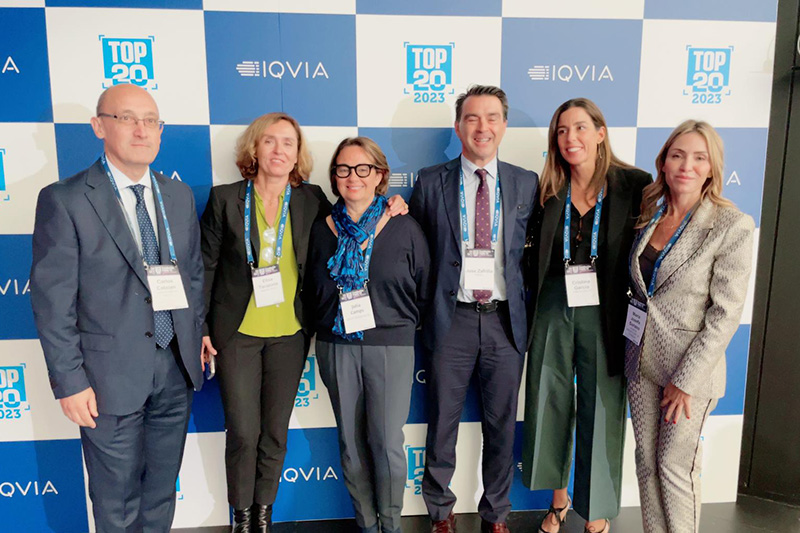
by S0p0rt3 | Oct 24, 2023 | Ribera |
- The Torrejón and Vinalopó university hospitals and the Denia hospital, public centres managed by Ribera, receive the most prestigious recognition in healthcare for their quality and efficiency indicators.
- Denia hospital, the most awarded hospital of the health group, after comparing results among more than 200 Spanish health centres, which undergo the evaluation of an independent scientific committee.
Ribera Hospitals received a total of seven TOP20 awards at a ceremony held today in Madrid, which each year brings together the best hospitals in Spain to distinguish the health centres with the best indicators of quality and efficiency in management, as well as the number of surgical procedures without admission, the percentage of readmissions, complications and mortality rate, among others. Three of these awards are for Global Management, the most prestigious recognition of the ceremony, and have gone to the Torrejón and Vinalopó university hospitals and the Hospital de Denia, public health centres managed by the Ribera health group under concession.
This year, the university hospitals of Torrejón and Vinalopó have also achieved recognition in the TOP20 in the category of Women’s Area, as hospitals with Obstetrics and Breast and Uterine Surgery. Denia Hospital, for its part, has been recognised in these awards for its work in the Nervous and Respiratory areas, in addition to the Global Management award mentioned above. Two other hospitals in the group, Ribera Hospital de Molina and Ribera Povisa Hospital, were finalists in Traumatology and Digestive Medicine.
Last year, the three public hospitals managed by the Ribera healthcare group also won the TOP20 award for best overall management, confirming the commitment to excellence and quality in patient care at the Denia, Vinalopó and Torrejón hospitals, as well as their good management indicators, contrasted by independent entities, such as the one that coordinates the TOP20. These awards compare results among more than 200 Spanish healthcare centres, which voluntarily submit themselves to the evaluation of some thirty indicators, and a scientific committee distinguishes those centres with better performance and greater quality and efficiency of care, in aspects such as the efficient management of hospital stay and outpatient surgery, compared to the measurement of readmissions, complications and mortality, adjusted to risk.
These awards divide hospitals into different categories to facilitate comparison between centres and similar management contexts, and distinguish the performance of those hospitals with the best overall balance in the 120 indicators of the eight clinical areas reviewed. In general terms, it offers the healthcare sector a useful tool for the improvement of results, based on quality, performance and efficiency indicators, as well as recognising good practices in the sector.
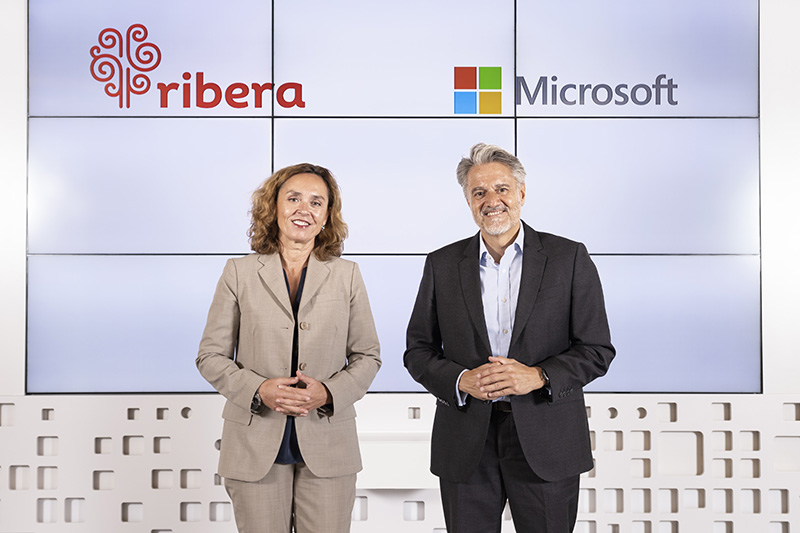
by S0p0rt3 | Oct 19, 2023 | Ribera |
- Both entities will work on the development of research projects and the application of cutting-edge technologies, such as Generative AI or machine learning, in the field of healthcare for the modernisation and transformation of medical records and medical information capture processes, among others.
- The joint developments of Artificial Intelligence solutions will help optimise administrative processes and improve healthcare, supported by Microsoft’s cloud services, which offer maximum guarantees in terms of security, privacy and regulatory compliance.
- The agreement also makes Futurs, Ribera’s technology company, a Microsoft partner. It will also promote interaction with startups and innovative companies to address challenges in the field of healthcare for the benefit of patients and improved care.
Microsoft and the Ribera healthcare group have announced a strategic partnership to advance the use of cutting-edge technologies, such as Artificial Intelligence (AI) and Generative AI, in the field of healthcare. This alliance aims to transform and improve patient care and healthcare management.
A key aspect of this agreement, which was signed today by Elisa Tarazona, CEO of the Ribera Group, and Alberto Granados, President of Microsoft in Spain, is the application of Generative AI to simplify administrative tasks in the healthcare sector. For example, these innovative solutions have the potential to reduce administrative fatigue by freeing up valuable time for healthcare staff, allowing them to focus and devote more time to patient care.
Ribera has a modular medical records platform, Cynara, deployed on Microsoft Azure cloud services, to provide a global response to clinical and administrative activity. The collaboration aims to take the modernisation of healthcare information systems a step further, evolving from a classic vision to a patient-centred one. To this end, Ribera and Microsoft will work on the transformation of information capture processes, throughout all phases of the care processes, by means of non-invasive collection systems. This initiative aims to make medical data management more efficient, humane and accurate than ever before.
In the words of Elisa Tarazona, CEO of the Ribera Group, “We are committed to offering the best possible medical care to our patients, and we are committed to digitalisation, hand in hand with a leader like Microsoft, which will help us take an important step forward by taking advantage of the latest technologies. Microsoft has always been a close ally and, with the application of AI, we can make a disruptive leap in our processes, free up administrative time for our healthcare professionals and focus on what is most important: caring for people’s health”.
At Microsoft, we are committed to driving the digital transformation of organisations across all industries,” said Alberto Granados, president of Microsoft Spain. AI has the potential to improve healthcare and medical care and accelerate scientific research. It is a tool that will be a revolutionary step forward in both diagnosis and treatment, and we are excited to reach agreements with organisations in this sector, such as the Ribera Group, that are committed to innovation to improve the quality of care.
Ribera is part of the global Microsoft 365 Copilot Early Access Program, which places the organisation in a pioneering position in the use of Generative AI. Copilot integrates into the Microsoft productivity environment applications that professionals use on a daily basis, helping them in their workflow and freeing them from repetitive tasks so they can focus more on their ultimate goal. Ribera and Microsoft are defining functional and process groups where Copilot could help optimise their way of working, assessing its impact, both at the level of administrative processes and potential tasks of clinical work groups or specialties.
The economic boost from the cloud
The cloud and the innovative services it supports, such as Generative Artificial Intelligence, have become one of the main priorities for companies, as it is key to accelerating the digitalisation of organisations and a fundamental pillar for generating revenue and reducing costs.
A recent study by IDC analyses the economic and social impact of the Microsoft cloud in Spain, its long-term implications and the growth opportunities it represents for companies. In the healthcare sector, the cumulative economic growth in the period 2022-2025 is estimated at 540 million dollars. Collaborations such as the one initiated with the Ribera Group translate into significant progress in internal activity, impacting on the organisation’s productivity and economic results.
Collaboration with startups and innovative companies
The agreement signed between Microsoft and Ribera also involves collaboration with Futurs, the group’s technology company, which thus becomes a Microsoft partner. Futurs’ objective is to provide an optimal and comprehensive response to the needs of the population, transforming healthcare through innovation and technology. Futurs develops both proprietary solutions and co-innovation projects, and offers strategic consulting, development and IT operations services for healthcare institutions, both in Spain and abroad.
The collaboration between Ribera and Microsoft also includes a commitment to the development of digital health projects on several fronts, using Microsoft technologies to improve the quality and efficiency of medical services. This includes the implementation of video consultation through solutions such as Microsoft Teams, as well as the modernisation of Ribera’s administrative, logistical and internal staff management platforms and processes.
In addition, Microsoft and the Ribera Group are looking to the future, with plans to interact with the ecosystem of partners and startups in the healthcare sector. To this end, workshops will be held to evaluate solutions provided by startups in response to the needs identified, and advice and guidance will be provided within the programmes offered by Microsoft for startups and scaleups working in the field of healthcare.
For more information, please visit the Microsoft UK News Centre.
About Ribera Group
Ribera is a business group founded in 1997, specialising in the management of innovative healthcare projects. With more than 9,200 professionals, its vocation is to transform the way we work and innovate in healthcare management, to improve the health and wellbeing of the population.
About Microsoft
Microsoft (Nasdaq “MSFT” @microsoft) is driving digital transformation for the era of the intelligent cloud and the Intelligent Edge. Its mission is to help every person and every organisation on the planet do more in their everyday lives.
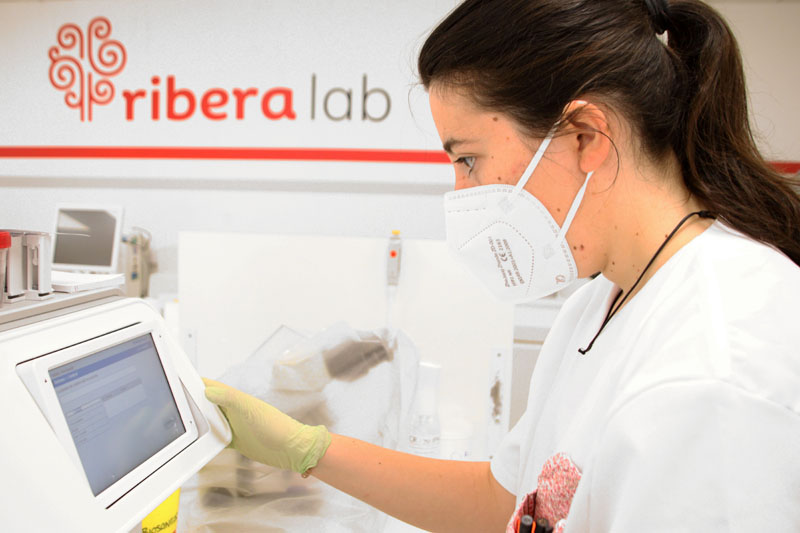
by S0p0rt3 | Oct 3, 2023 | Ribera |
- Around 1,000 samples are analysed daily between Primary Care and the hospital itself, where the number of professionals has been increased and automation has been expanded, as in the group’s central laboratory.
- There are now five Ribera Group hospitals integrated in Ribera Lab: Ribera Polusa, Ribera Juan Cardona, Ribera Hospital de Molina and the Vinalopó and Torrejón university hospitals, in addition to their health areas.
Ribera Lab, the laboratory division of the Ribera healthcare group, has taken on the integral biological diagnosis of all patients at the University Hospital of Torrejón and its health area, i.e. the analysis of all samples taken from patients at the hospital and the area’s primary care centres. The analysis and management of all blood, urine and biological fluid analyses in Torrejón has meant a reinforcement of professionals in the health centre itself and in the central laboratory of Ribera, as well as in the automation processes.
The Torrejón Hospital laboratory alone analyses around 1,000 samples a day, from its own patients and primary care centres. For its part, Ribera Lab’s central laboratory has technology that allows it to carry out more than 3,000 determinations a day, with technology capable of analysing 800 tubes an hour, with the capacity to increase it as required.
Ribera Lab has more than 120 professionals and is already integrated in five of the health group’s hospitals: Ribera Polusa, Ribera Juan Cardona, Ribera Hospital de Molina and the university hospitals of Vinalopó and Torrejón, in addition to their health areas. It has a constitutional, prenatal and oncohematological cytogenetics laboratory, a molecular biopathology laboratory for hereditary diseases, infections and oncohematological diseases, in addition to the central clinical laboratory. In addition, the group’s laboratory division covers other clinics and hospitals within the group as well as external healthcare centres. “Responding efficiently and swiftly to patients’ needs is always our priority,” says Ribera Lab management director Mayte Alarcón.







Recent Comments